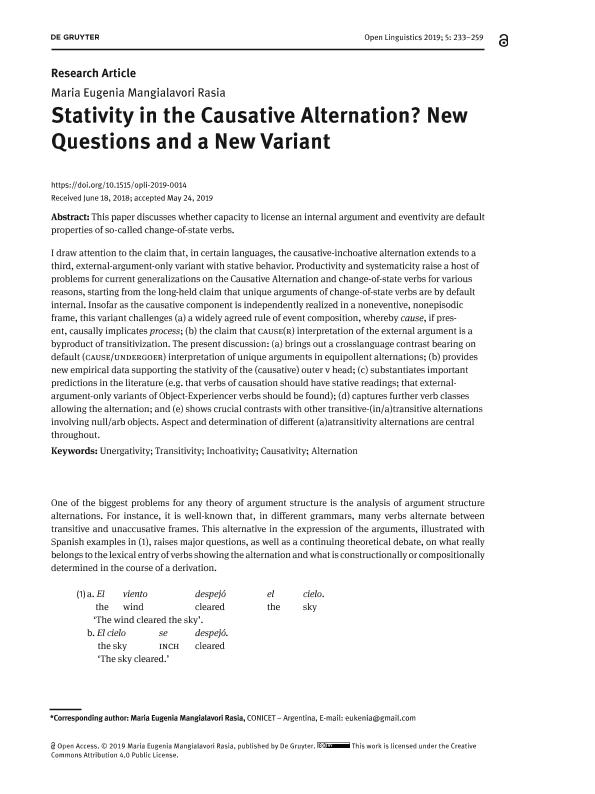Artículo
Stativity in the causative alternation? New questions and a new variant
Fecha de publicación:
05/2019
Editorial:
De Gruyter
Revista:
Open Linguistics
ISSN:
2300-9969
Idioma:
Inglés
Tipo de recurso:
Artículo publicado
Clasificación temática:
Resumen
This paper discusses whether capacity to license an internal argument and eventivity are default properties of so-called change-of-state verbs.I draw attention to the claim that, in certain languages, the causative-inchoative alternation extends to a third, external-argument only variant with stative behavior. This variant presents a problem for current generalizations on the Causative Alternation and change-of-state verbs for various reasons, starting from the long-held claim that unique arguments of change-of-state verbs are by default internal. As the causative componentis independently realized in a noneventive, nonepisodic frame, this variant challenges: (a) a widely-agreed rule of event composition, whereby cause, if present, causally implicatesprocess; (b) the claim that CAUSE(R) interpretation of the external argument is a byproduct of transitivization. The discussion: (a) brings out a crosslanguage contrast bearing on default (CAUSE/UNDERGOER) interpretation of unique arguments in equipollent alternations; (b) provides new empirical data supporting the stativity of the (causative) outer v; (c) substantiates important predictions in the literature (e.g. verbs of causation should have stative readings; external-argument-only variants of Object-Experiencer verbs should be found); (d) captures further verb classes allowing the alternation; (e) shows crucial contrasts with other transitive-(in/a)transitive alternations involving null/arb objects.
Palabras clave:
UNERGATIVITY
,
INCHOATIVITY
,
TRANSITIVITY
,
CAUSATIVITY
,
ALTERNATION
Archivos asociados
Licencia
Identificadores
Colecciones
Articulos(CCT - ROSARIO)
Articulos de CTRO.CIENTIFICO TECNOL.CONICET - ROSARIO
Articulos de CTRO.CIENTIFICO TECNOL.CONICET - ROSARIO
Citación
Mangialavori Rasia, Maria Eugenia; Stativity in the causative alternation? New questions and a new variant; De Gruyter; Open Linguistics; 5; 1; 5-2019; 233-259
Compartir
Altmétricas




